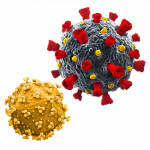The vast majority of (mostly beneficial, when balanced) gut bacteria live along the gut lining, which is made of mucus and acts as a barrier to protect the rest of the body from the contents of your digestive tract— so that potentially inflammatory microbes (and proteins from incompletely digested food) don’t leak into your bloodstream. When all is working well, the exquisitely complex and sensitive gut lining allows nutrients through but keeps everything else out.
To maintain this protective barrier you need to give your good bacteria the food they need to thrive; specifically, fiber. While mice colons are not quite identical to the colon of humans, a 2018 experiment made this point: after only three days of a fiber poor diet, the mucus layer of mouse gut linings began to deteriorate. When the gut lining begins to “leak” in this way, the proteins from incompletely digested food (e.g., 21st century Franken-wheat) and bacterial toxins (actually often neuro-toxins) are inappropriately permitted passage into the bloodstream where their presence can trigger inflammation, allergies and even autoimmune reactions.
(I appreciate good bread and pizza as much as the next guy and will never be able to abstain 100%, but I do give it up for months at a time and almost immediately notice the beneficial changes. Just saying. And I realize that entire civilzations were not only organized around but thrived on the cultivation of wheat. So there’s that. I cannot yet say if some of these so-called "heritage" or heirloom wheats— Einkorn and the like (and also bread and pizza makers who honor the more traditional long rising times, like my Columbus, OH gluten mentor Dan the Baker (shoutout to Dan), that give the yeast more time to gobble up the gluten)— are really the solution. But once the gut has healed from exposure to our modern day atrocity, for many people there does seem to be something akin to a “dose-response window” where s/he can maybe be okay with small quanitites and frequencies of the stuff. Modern day, everyday harm reduction.)
I appreciate good bread and pizza (or a cold and cloudy beer) as much as the next guy and will never be able to abstain 100%, but I do give it up for months at a time and almost immediately notice the beneficial changes.
In fact, this sort of “leaky” gut lining phenomenon has, over many years, been linked to the development of type 1 diabetes (aka juvenile, insulin-dependent or autoimmune diabetes), celiac disease (also possessing an autoimmune component), asthma, MS, IBD and more. Less serious but arguably no less annoying complications include acne, rosacea, headaches, brain fog and fatigue. (I’m adding osteoporosis and pretty much all arthritis-es to this list, after on again/off again study with Dr. Sam Yanuck and Dr. Susan Blum.) As this field of inquiry and research matures, there is a growing consensus in the field that the inappropriate leakage of proteins, neurotoxic lipopolysaccharides (aka LPS, from only the “gram negative” bacteria in the gut) and various other microbial metabolites are a primary cause of the inflammation (and neuro-inflammation) and immunosenescence seen in aging.
From my vantage point, this is of particularly acute interest to HIV+ folks because even well-suppressed HIV (and now I am finding out the very medications used to achieve this suppression!) is shown over the course of years and decades to ramp up both inflammatory signaling and immune activation, as well as laying the groundwork for premature endothelial and immune senescence or aging. So while maybe we are (mostly, possibly) powerless to do anything against these unpleasant realities, we can take measures (many measures actually) to mitigate and “dampen down” the overall, body-wide inflammatory and immunoreactive picture/equation. More on this in future post.
This may be of particular interest to HIV+ folks (as well as folks on daily PrEP) because even well-suppressed HIV (and ART itself) has/have been linked to neuroinflammation and premature endothelial senescence.
Gut health and brain health are closely connected— the gut and the brain communicate with each other by sending chemical signals along what is called the gut-brain axis. An exploding body of research in recent years, much of it reported here, points to a strong link between what’s going on in your gut and various mood and behavioral disorders including anxiety, depression, autism and even neurodegenerative diseases.
How to build strong and maintain your gut barrier? You already know: fiber, fiber, fiber. (And important too: remove or at least minimize the insults. Short list being gluten, NSAIDs, antibiotics, artificial sweetners, alcohol, seed oils, most emulsifiers and any produce (mostly grains & potatoes, but the list is growing) treated with glyphosate aka Roundup. Oh, and chronic stress....)
How to build and maintain a robust and juicy gut barrier? Minimize the daily insults and fiber, fiber, fiber.
Probiotics (even home ferments) are not necessarily sufficient. When the aforementioned fiber-starved mice were given a probiotic supplement of bifidobacteria, yes, their mucus layers grew— but the “leakiness” was not repaired. Only when prebiotic fiber was added to their food (in this case inulin, but the list is vast; more in upcoming post...) did their gut linings actually heal. So yes, the “good bugs” (in this case, bifidobacteria) were key to proper functioning of the gut lining, but without the required prebiotic “food,” they could not grow and multiply and really “be all that they could be.”
Companies like Viome and DayTwo purport to analyze your colonic contents and then provide you with a report on both the relative balance of gut microflora but also lists of foods to emphasize and de-emphasize in order to achieve greater gut barrier function and harmony, but are not without their (multitudinous & oftentimes scathing) critics. The IFM faculty seem to prefer the (16S rRNA-based) tests of companies like Genova Diagnostics (GI Effects), Doctors Data (GI360) or Diagnostic Solutions (GI-MAP) for these kinds of analyses. They make smaller promises but are able to keep (most of) them. A future post will focus exclusively on how (and if) it really works— as well as a look at the growing list of its up-start competitors. It’s an absolutely exploding field and one around which one could design an entire curriculum or seminar.
There are a number of companies that will analyze your poop and give you reams of helpful feedback on microflora balance and dietary suggestions to optimize everything, some more reputable than others.
Let’s circle back to that stress component though. This is the suckiest of all this. You can control your daily or weekly consumption of seed oils and gluten or ibuprofen, Cosmos and Appletinis, but stress-wise you can really only buffer yourself (maybe also re-program your brain, but that sounds like lots of (high-quality) yoga classes or sessions of CBT) against. More on that in a future post.
There is clear evidence how stress affects not only digestion (basically shutting down stomach acid, bile secretion and everything else downstream) but also the composition of the microbiota (also called the microbiome) and the integrity of the gut lining itself. In one study, participants (humans this time, not rodents) exposed to chronic stressor actually changed the makeup of their gut bacteria (microbiota)— losing relative abundance of many of the beneficial bugs while increasing the relative abundance of the bacteria generally agreed to be pathogenic; i.e. the bad bugs.
This is not limited to bacteria but also unfortunately often includes fungal overgrowths, specifically candida. Which also can affect mood, sleep, energy levels and focus. More on this in a future post.
Let’s circle back to that stress component though: the suckiest ingredient of all this— because it’s often (mostly) beyond our immediate control.
So your gut has the power to change your brain, and your brain has the power to change your gut— and how you age along with it. For millennia the inner workings of the gut were shrouded in mystery, but with recent and ongoing research and revelations, the secrets are being revealed.
Future posts will go into a bit more detail on fiber sources, daily fiber intake targets as well as some prebiotic and probiotic cheats when there just isn’t enough time or meals in the day to give your good bugs all they need to thrive. Oh, and if you are now curious, as I was, to read anything and everything by Elie Metchnikoff...
Mike Barr, a longtime Poz Contributing Editor and founding member of and scribe for the Treatment Action Group (TAG), is a functional medicine practitioner and herbalist in NYC. Reach out to him here. Or sign up for his curated (and generously discounted) professional grade supplement store here.








Comments
Comments